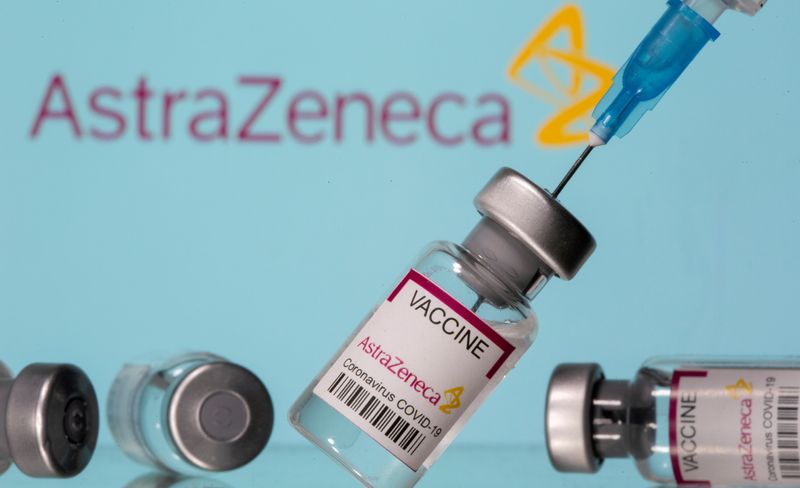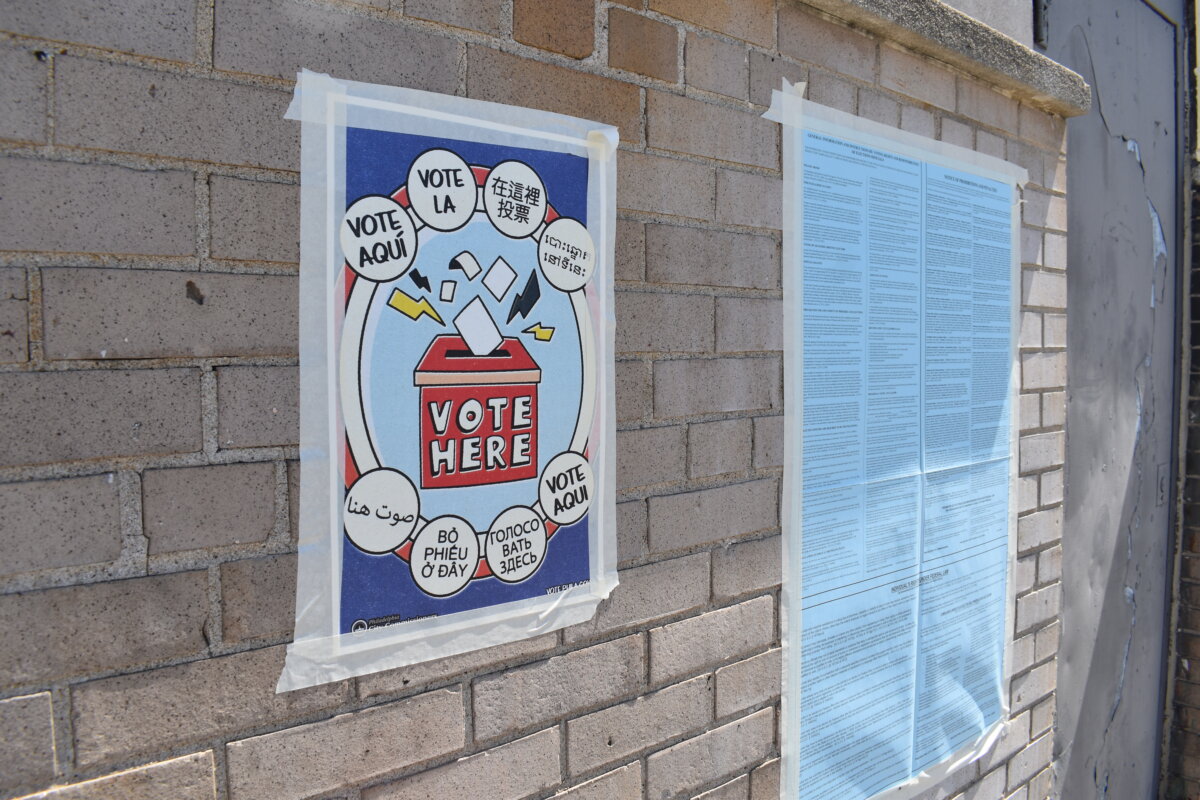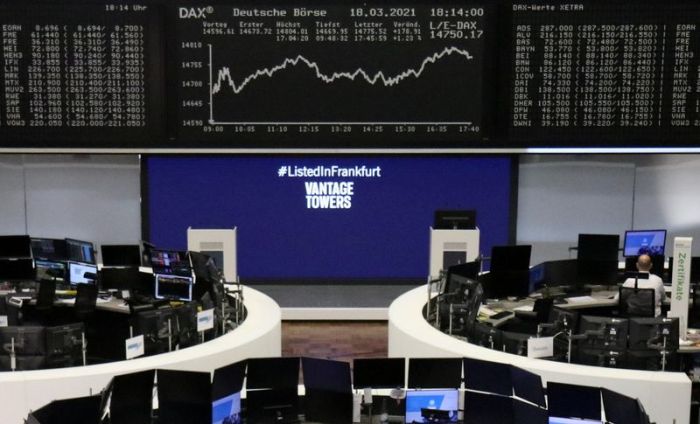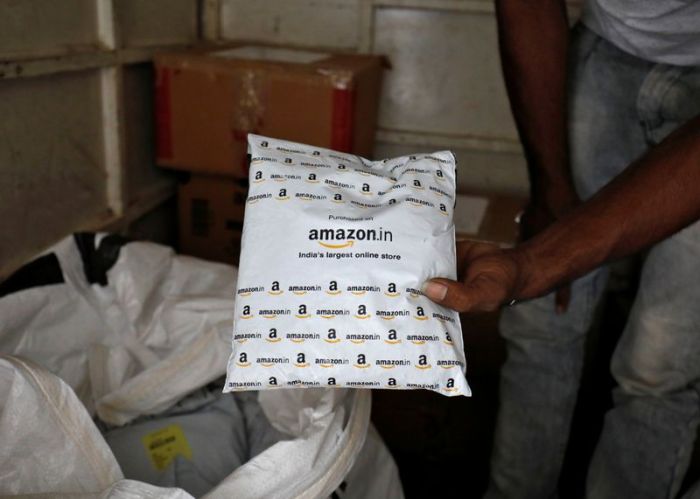AMSTERDAM/LONDON (Reuters) – Europe pushed to get its COVID-19 vaccination drive back on track on Friday after EU and British regulators said the benefits of AstraZeneca’s shot outweighed any risks and the World Health Organization gave its backing to it.
The end to the suspension of AstraZeneca shots by more than a dozen countries will now kick off a test of public confidence, both in the vaccine and regulators who are under unprecedented scrutiny as variants of the coronavirus spread and the global death toll climbs beyond 2.8 million.
At least 13 European countries stopped administering the shot after reports of a small number of blood disorders. More than 55 million people have received a vaccine from all manufacturers in the EU and the European Economic Area (EEA), which links 30 European countries.
The hold-up with AstraZeneca slowed an already faltering inoculation campaign across the 27-nation European Union, which is lagging ex-member state Britain and the United States.
Europe’s leaders say they need to accelerate their vaccination drive, with deaths in the EU topping 550,000, less than a 10th of the bloc’s population inoculated and growing signs of an imminent third wave of infections.
Germany, Italy and others countries including Indonesia began on Friday to administer the shots they had suspended after the EU drug regulator’s investigation, which covered about 30 cases of rare brain blood clots out of 20 million people who received the AstraZeneca shot in the UK and EU.
France’s health regulator, however, recommended that only over 55s should get AstraZeneca shots due to concern that those younger were more at risk of clots, while Lithuania will let people choose their vaccine in a possible litmus test of sentiment.
The European Medicines Agency (EMA) came to what it called a clear conclusion that the vaccine’s benefits in protecting people from coronavirus-related death or hospitalisation outweighed the possible risks.
Still, EMA said a link between rare events of blood clots in the brain and the shot could not be definitively ruled out and it would continue its scrutiny, as will the British Medicines and Healthcare products Regulatory Agency (MHRA).
“This is a safe and effective vaccine,” EMA Director Emer Cooke told a briefing on Thursday. “If it were me, I would be vaccinated tomorrow.”
On Friday, Finland suspended the use of the vaccine while it investigates two possible cases of blood clots. It estimated that the investigation would take at least one week.
PRUDENT REINTRODUCTION
The WHO became the latest public health body to endorse the shot, saying on Friday that available data do not point to any overall increase in clotting conditions. It said it would continue to monitor for any adverse effects.
That came after its vaccine advisory committee’s review.
The EMA said on Thursday it would update its guidance on the vaccine to include an explanation for patients about potential risks and information for healthcare professionals to help people recognise when they may need medical assistance.
Germany resumed administering the vaccine on Friday morning after a three-day pause as the nation’s health minister warned there were not enough vaccines in Europe to contain a third wave of coronavirus infections. [L8N2LH2T9]
“We can reintroduce AstraZeneca but prudently, with informed doctors and appropriately educated citizens,” Health Minister Jens Spahn said.
In Italy, where Prime Minister Mario Draghi said the country was also resuming vaccinations with AstraZeneca’s shot, about 200,000 inoculations had been put on hold, leaving regions in control of inoculations to reschedule them.
“They already have the doses, it’s not like we have to distribute more today,” an Italian health ministry spokesman said.
Red Cross organisers at Rome’s Termini vaccination centre said there was a queue of people waiting well ahead of their booked appointments when the centre reopened in the afternoon.
“The situation here is very brisk…This tells us that people want to get vaccinated and they still have faith in this good AstraZeneca vaccine,” said Red Cross health service coordinator Valerio Mogini.
“I did have a few doubts but as soon as the validation of the vaccine was confirmed we decided to do it, we trust them and we are calm”, Federica, 24, a teacher, said while awaiting her shot at a drive-in vaccination stop in Milan.
Spain will resume inoculations from Wednesday with the Netherlands also planning to start using AstraZeneca shots again next week.
Canada also gave its support to the vaccine though Denmark and Sweden both said they needed more time to make a decision.
French Prime Minister Jean Castex said he would get the shot on Friday to try to promote public acceptance. Still, the country’s recommendation for giving the shot only to those 55 and older reflects a lingering reluctance.
“The EMA has identified a possible increased risk of (thrombosis) in people under 55 years old,” France’s drug regulator said.
The central African country of Cameroon, meanwhile, suspended the AstraZeneca vaccine on Friday, saying it was a precautionary move, without providing specifics.
‘INCREDIBLY REASSURING’
Amid a mixed global picture, some experts sought to reinforce confidence in AstraZeneca’s vaccine, which is seen as an important asset globally due to its relatively easy storage and transport requirements and its low price compared to mRNA vaccines made by Pfizer and Moderna.
“What we really should be focusing on is that this is incredibly reassuring. The processes are working, the safety monitoring that we all expect from our authorities is happening,” Andrew Pollard, who runs the Oxford Vaccine Group, told BBC radio.
“We do need to continue to monitor safety, but in the end it’s the virus we’re fighting, not the vaccines.”
Oxford University partnered with AstraZeneca to develop the vaccine.
Britain’s MHRA is investigating five cases of the rare brain blood clot among 11 million shots administered in the country.
The MHRA, like the EMA, said it would scrutinise reports of clots in the cerebral veins – know as sinus vein thrombosis, or CSVT – occurring together with lowered platelets soon after vaccination.
But the agency said the vaccine should continue to be used and one official said Britain’s roll-out would probably carry on even if a link were proven.
The drugmaker’s own review covering more than 17 million people who have received its shot in the EU and Britain found no evidence of increased risk of blood clots.
(Reporting by Anthony Deutsch and Toby Sterling in Amsterdam, Ludwig Burger in Frankfurt, Kate Kelland and Alistair Smout in London, John Miller in Zurich and Caroline Copley in Berlin, Eleanor Biles in Rome and Alex Fraser in Milan; Writing by John Miller and Josephine Mason; Editing by Nick Macfie and Mark Heinrich)



















